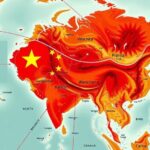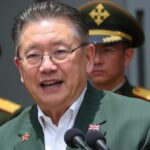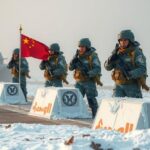Global Risks in 2025: Armed Conflicts and Economic Tensions
The WEF survey identifies armed conflicts, particularly the ongoing Ukraine crisis and tensions around Taiwan, as major risks to global prosperity in 2025. Trade frictions, especially between the US and China, elevate concerns of economic confrontation. The report indicates growing military expenditures and the erosion of the UN’s effectiveness, alongside the rising impact of extreme weather events and misinformation, as critical issues for the coming years.
The World Economic Forum (WEF) report reveals that global economic growth and prosperity face significant risks in 2025 due to the escalation of armed conflicts, particularly in Ukraine, the Middle East, and Sudan. A striking 23% of survey participants identified state-based armed conflict as a major concern. This category encompasses various forms of military engagements between states and non-state actors, driven by political, ideological, or religious motivations.
The report anticipates potential conflicts involving Taiwan and China as military activities intensify, raising fears of miscalculation leading to unintended consequences. Following the ongoing pattern of increased global armed conflicts since 2014, respondents cited this trend as indicative of a broader geopolitical recession. Furthermore, trade tensions, particularly between the US and China, could further heighten conflict scenarios.
Geoeconomic confrontation, characterized by sanctions and tariffs, was marked as the third greatest global risk by 8% of respondents. These measures threaten to create a protectionist environment, adversely affecting global trade. Countries at risk from US trade practices include South Korea, China, Japan, Canada, and India, with potential impacts on numerous other nations.
Emerging markets and low-income countries are anticipated to suffer the most from geoeconomic fragmentation, reinforcing business leaders’ concerns about a global economic downturn. The survey highlights national security as a prime focus for governments, with declining effectiveness of the UN Security Council undermining multilateral cooperation.
As national security becomes paramount, countries may engage in unilateral military actions and escalate arms investment, evidenced by rising global military expenditures. The report emphasizes that extreme weather events also pose significant risks, with substantial economic losses noted from climate-related disasters.
Role of misinformation, societal polarization, and environmental changes constitute additional risks noted in the report. The collective assessment suggests a worsening scenario for global stability going into 2025.
The WEF’s Global Risks Perception Survey underscores increasing concerns over armed conflicts and their impact on global economic conditions as we approach 2025. It highlights the significance of geopolitical tensions, especially relating to notable regions such as Taiwan and the Middle East. Concurrently, the report reflects on trade dynamics, particularly between the US and China, and how these factors intertwine with military engagements. The long-term implications of such conflicts on multilateral organizations, trade practices, economic stability, and climatic challenges underscore the complex landscape of global risks.
The WEF report elucidates grave concerns regarding the risks posed by state-based armed conflict and geoeconomic confrontation as we approach 2025. With traditional diplomacy weakening, nations may increasingly resort to unilateral military strategies amid rising global tensions. Extreme weather phenomena and economic fragmentation only exacerbate these challenges, revealing a precarious pathway towards stability. As countries navigate this challenging terrain, the outlook remains disconcertingly uncertain for global governance and growth.
Original Source: www.straitstimes.com








Post Comment